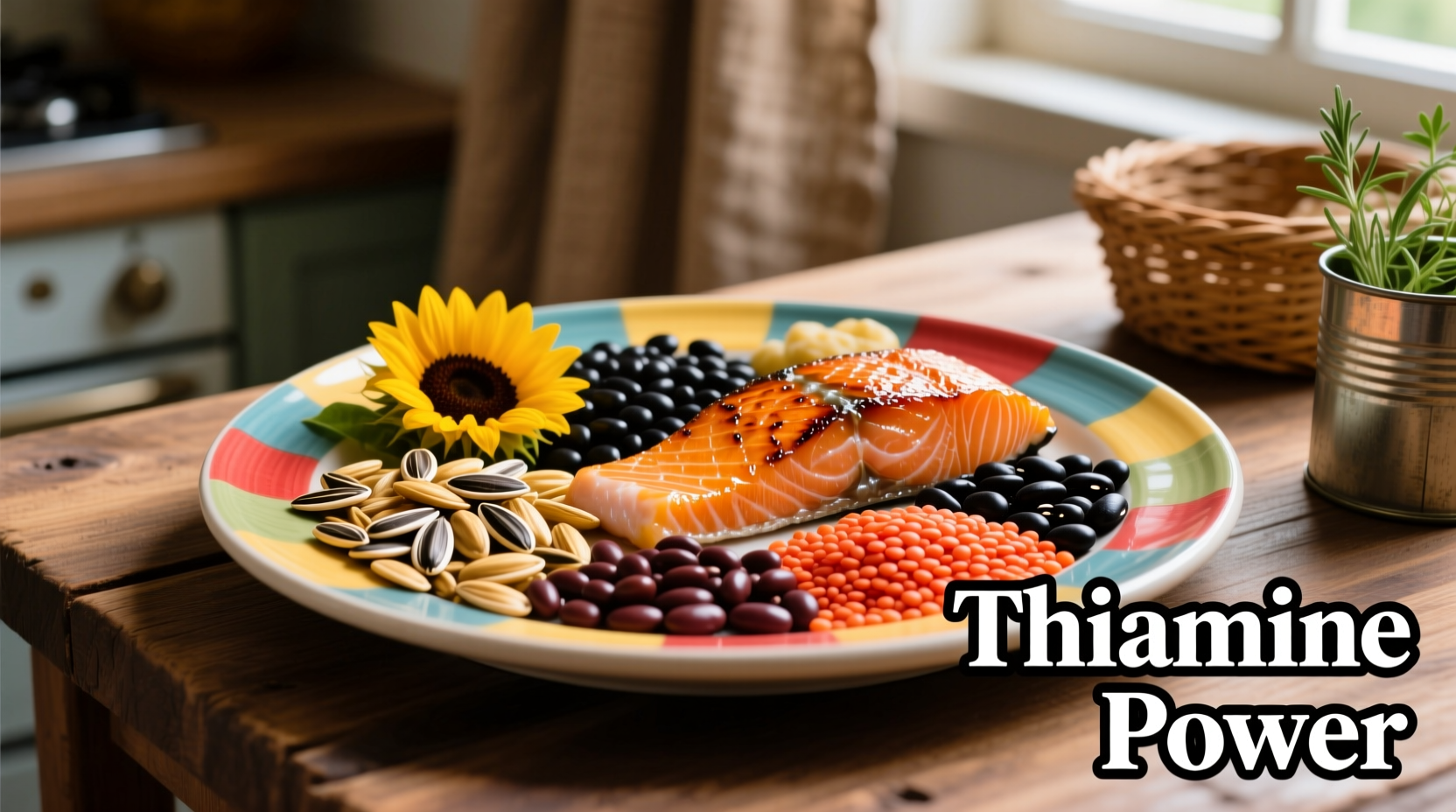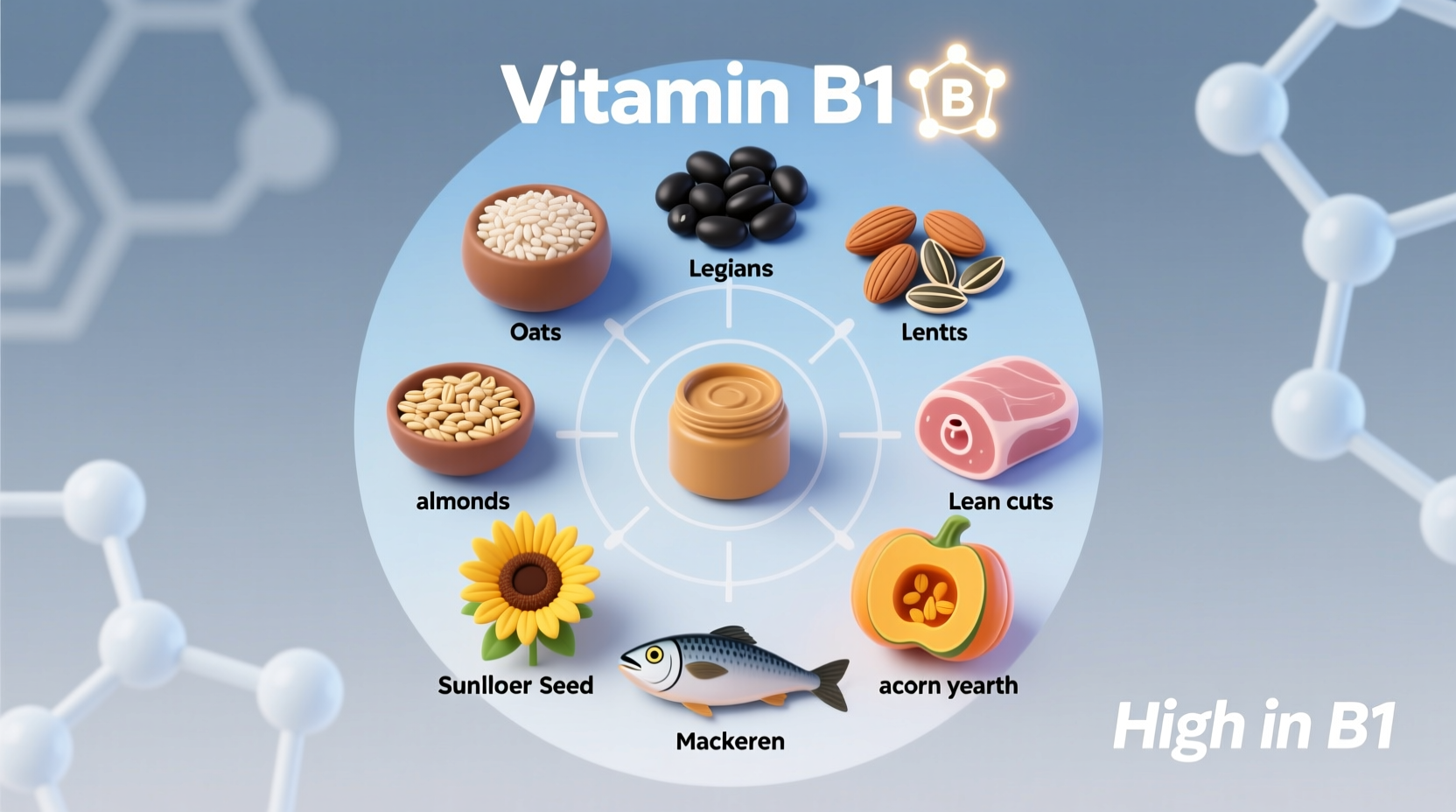Discover exactly which foods deliver the most vitamin B1 per serving and how to incorporate them into your daily meals. This guide cuts through confusing nutrition information to give you practical, science-backed recommendations you can use immediately to support your energy levels and nerve function.
Why Vitamin B1 Matters More Than You Think
Vitamin B1, also known as thiamine, serves as a critical coenzyme in your body's energy production system. Without adequate thiamine, your cells struggle to convert carbohydrates into usable energy. This essential nutrient also maintains proper nerve function and supports cognitive health. According to the National Institutes of Health, approximately 10% of Americans have marginal thiamine status, with higher rates among specific populations.
Your Practical Guide to Top Thiamine-Rich Foods
When selecting vitamin B1 sources, focus on foods delivering at least 0.2mg per typical serving. These options provide substantial thiamine while fitting seamlessly into various dietary patterns. Unlike supplements, these whole food sources offer additional nutrients that enhance absorption and utilization.
| Food Source | Serving Size | Thiamine (mg) | % Daily Value |
|---|---|---|---|
| Sunflower seeds | 1/4 cup | 1.07 | 89% |
| Pork chop | 3 ounces | 0.89 | 74% |
| Black beans | 1 cup | 0.43 | 36% |
| Trout | 3 ounces | 0.32 | 27% |
| Fortified breakfast cereal | 1 serving | 0.30 | 25% |
| Lentils | 1 cup | 0.28 | 23% |
Data sourced from USDA FoodData Central (Release 2024), representing cooked or prepared forms where applicable. Values may vary based on preparation methods and specific product formulations.
How to Maximize Thiamine Absorption From Your Meals
Certain cooking techniques preserve thiamine better than others. Since vitamin B1 is water-soluble and heat-sensitive, follow these professional chef-recommended practices:
- Steam vegetables instead of boiling to prevent nutrient loss into cooking water
- Add acidic ingredients like lemon juice to legume dishes, which enhances thiamine stability
- Pair thiamine-rich foods with magnesium sources (like nuts and seeds) to improve utilization
- Avoid excessive heat when cooking pork - medium-rare preserves more nutrients than well-done

Special Considerations for Optimal Thiamine Intake
Certain populations require special attention to thiamine intake. According to research published in the Journal of Nutrition and Metabolism, these groups often need higher thiamine consumption:
- Pregnant and breastfeeding women: Require 1.4mg daily due to increased metabolic demands
- People with diabetes: Higher excretion rates may necessitate additional thiamine
- Regular alcohol consumers: Alcohol interferes with thiamine absorption and storage
- Those taking diuretics: Certain medications increase thiamine excretion
It's important to note that processing significantly reduces thiamine content in grains. Whole wheat bread contains approximately 0.14mg per slice, while refined white bread drops to just 0.04mg. This dramatic difference explains why many countries mandate thiamine fortification of refined grain products.
Practical Meal Planning with High B1 Foods
Creating thiamine-rich meals doesn't require complicated recipes. Try these simple combinations that deliver at least 75% of your daily requirement:
- Breakfast: Fortified cereal with sunflower seeds and banana (0.9mg)
- Lunch: Lentil soup with whole grain bread (0.6mg)
- Dinner: Pork tenderloin with black bean salad (1.1mg)
For vegetarians and vegans, focus on legumes, seeds, and fortified products. A single cup of cooked navy beans provides nearly half your daily thiamine needs. Remember that plant-based thiamine has slightly lower bioavailability than animal sources, so aim for 10-15% higher intake from plant foods.
Recognizing When You Might Need More Vitamin B1
Early thiamine deficiency symptoms often go unnoticed. The Mayo Clinic identifies these subtle warning signs:
- Unexplained fatigue that doesn't improve with rest
- Mild memory lapses or difficulty concentrating
- Loss of appetite without other explanation
- Occasional muscle weakness
Left untreated, severe deficiency can lead to serious neurological conditions. If you experience persistent symptoms, consult a healthcare provider rather than self-treating with supplements.











 浙公网安备
33010002000092号
浙公网安备
33010002000092号 浙B2-20120091-4
浙B2-20120091-4